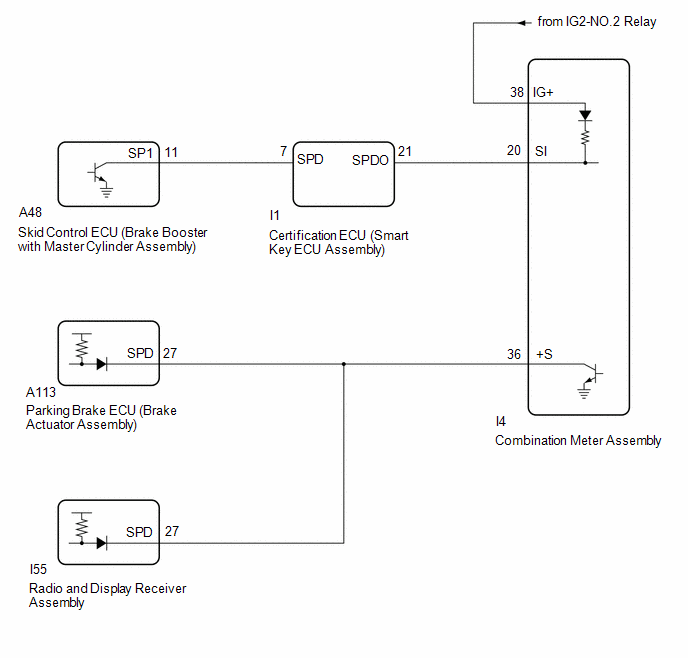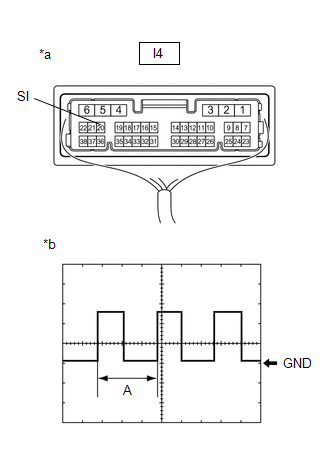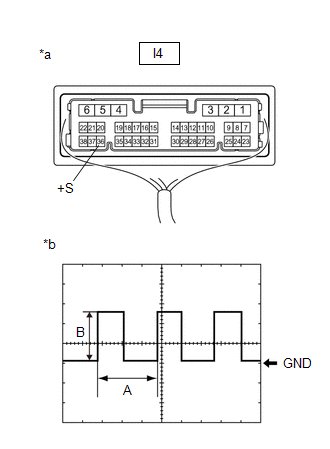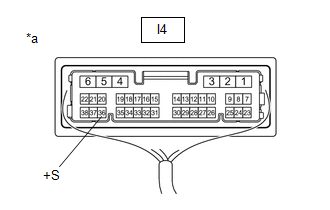- Positive (+) tester probe → I4-38 (IG+)
- Negative (-) tester probe → I4-20 (SI)
| Last Modified: 07-31-2024 | 6.11:8.1.0 | Doc ID: RM100000001N5O5 |
| Model Year Start: 2021 | Model: Corolla | Prod Date Range: [04/2020 - 09/2022] |
| Title: METER / GAUGE / DISPLAY: METER / GAUGE SYSTEM (for HV Model): Speed Signal Circuit; 2021 - 2022 MY Corolla Corolla HV [04/2020 - 09/2022] | ||
|
Speed Signal Circuit |
DESCRIPTION
The combination meter assembly receives the vehicle speed signal from this circuit. The wheel speed sensors produce an output that varies according to the vehicle speed. The wheel speed sensor output is received by the control ECU (brake booster with master cylinder assembly) which uses this information to create the vehicle speed signal. The vehicle speed signal is output from the control ECU (brake booster with master cylinder assembly) to the certification ECU (smart key ECU assembly) and then to the combination meter assembly. To create this signal, 12 V is output from terminal SI of the combination meter assembly to the certification ECU (smart key ECU assembly). The pulse signal is created by switching the transistor in the certification ECU (smart key ECU assembly) on and off, making the voltage on the wire drop to 0 V. A similar system is used for the output of this signal from the combination meter assembly via terminal +S. A voltage of 12 V or 5 V is applied to terminal +S from each ECU or relay that is connected to this terminal. The transistor in the combination meter assembly is controlled by the signal from the certification ECU (smart key ECU assembly). When this transistor is turned on, this transistor makes the voltage supplied by the various ECUs (via their respective internal resistors) drop to 0 V. Each ECU connected to terminal +S of the combination meter assembly controls its respective system based on this pulse signal.
HINT:
This circuit is used for the systems connected to terminal +S. This signal is not used for combination meter assembly operation. Combination meter assembly components such as the speedometer operate using data received via CAN communication. In addition, for some systems, vehicle speed information may be received via CAN communication.
WIRING DIAGRAM

CAUTION / NOTICE / HINT
NOTICE:
- When replacing the combination meter assembly, always replace it with a new one. If a combination meter assembly which was installed to another vehicle is used, the information stored in it will not match the information from the vehicle and a DTC may be stored.
- Before replacing the certification ECU (smart key ECU assembly), refer to Registration.
PROCEDURE
|
1. |
INSPECT COMBINATION METER ASSEMBLY (INPUT WAVEFORM) |

|
*a |
Component with harness connected (Combination Meter Assembly) |
|
*b |
Waveform |
(a) Check the signal waveform according to the condition(s) in the table below.
|
Item |
Condition |
|---|---|
|
Tester connection |
I4-20 (SI) - Body ground |
|
Tool setting |
5 V/DIV., 20 ms./DIV. |
|
Condition |
Power switch on (IG), wheel being rotated |
HINT:
When the system is functioning normally, one wheel revolution generates 4 pulses. As the vehicle speed increases, the width indicated by (A) in the illustration narrows.
Result |
Proceed to |
|---|---|
|
The measured waveform is similar to that in the illustration |
A |
|
The measured waveform is not similar to that in the illustration (Stuck low) |
B |
|
The measured waveform is not similar to that in the illustration (Stuck high) |
C |
| B |

|
| C |

|
|
|
2. |
INSPECT COMBINATION METER ASSEMBLY (OUTPUT WAVEFORM) |

|
*a |
Component with harness connected (Combination Meter Assembly) |
|
*b |
Waveform |
(a) Check the signal waveform according to the condition(s) in the table below.
|
Item |
Condition |
|---|---|
|
Tester connection |
I4-36 (+S) - Body ground |
|
Tool setting |
5 V/DIV., 20 ms./DIV. |
|
Condition |
Power switch on (IG), wheel being rotated |
HINT:
- When the system is functioning normally, one wheel revolution generates 4 pulses. As the vehicle speed increases, the width indicated by (A) in the illustration narrows.
- The waveform (B) changes depending on the connected ECUs.
Result |
Proceed to |
|---|---|
|
The measured waveform is similar to that in the illustration |
A |
|
The measured waveform is not similar to that in the illustration (Stuck low) |
B |
|
The measured waveform is not similar to that in the illustration (Stuck high) |
C |
| B |

|
| C |

|
|
|
3. |
CHECK HARNESS AND CONNECTOR (EACH ECU - COMBINATION METER ASSEMBLY) |
(a) Disconnect the A113 parking brake ECU (brake actuator assembly) connector.
(b) Disconnect the I55 radio and display receiver assembly connector.
(c) Disconnect the I4 combination meter assembly connector.
(d) Measure the resistance according to the value(s) in the table below.
Standard Resistance:
|
Tester Connection |
Condition |
Specified Condition |
|---|---|---|
|
A113-27 (SPD) - I4-36 (+S) |
Always |
Below 1 Ω |
|
I55-27 (SPD) - I4-36 (+S) |
Always |
Below 1 Ω |
| OK |

|
CHECK THE VOLTAGE AT TERMINAL SPD OF EACH ECU |
| NG |

|
REPAIR OR REPLACE HARNESS OR CONNECTOR |
|
4. |
INSPECT EACH ECU (INTERNAL SHORT) |

|
*a |
Component with harness connected (Combination Meter Assembly) |
(a) Disconnect one of the connectors below.
NOTICE:
After disconnecting a connector, perform all steps with all other ECUs connected.
|
Terminal No. (Symbol) |
ECU |
|---|---|
|
A113 |
Parking brake ECU (brake actuator assembly) |
|
I55 |
Radio and display receiver assembly |
(b) Measure the voltage according to the value(s) in the table below.
NOTICE:
Make sure to perform this inspection with the wheels stopped.
Standard Voltage:
|
Tester Connection |
Condition |
Specified Condition |
|---|---|---|
|
I4-36 (+S) - Body ground |
Power switch on (IG) |
4.5 to 14 V |
(c) Repeat steps (a) and (b) for each connected ECU.
HINT:
If the voltage changed to the specified voltage after disconnecting a connector, an internal short in the disconnected ECU is suspected.
Result |
Proceed to |
|---|---|
|
After performing the inspection procedure for all connectors, the voltage did not change to the specified voltage |
A |
|
When disconnecting the connector of the parking brake ECU (brake actuator assembly), the voltage changed to the specified voltage |
B |
|
When disconnecting the connector of the radio and display receiver assembly, the voltage changed to the specified voltage |
C |
| B |

|
| C |

|
|
|
5. |
CHECK HARNESS AND CONNECTOR (EACH ECU - COMBINATION METER ASSEMBLY) |
(a) Disconnect the A113 parking brake ECU (brake actuator assembly) connector.
(b) Disconnect the I55 radio and display receiver assembly connector.
(c) Disconnect the I4 combination meter assembly connector.
(d) Measure the resistance according to the value(s) in the table below.
Standard Resistance:
|
Tester Connection |
Condition |
Specified Condition |
|---|---|---|
|
A113-27 (SPD) or I55-27 (SPD) - I4-36 (+S) |
Always |
Below 1 Ω |
|
A113-27 (SPD), I55-27 (SPD) or I4-36 (+S) - Body ground |
Always |
10 kΩ or higher |
| OK |

|
| NG |

|
REPAIR OR REPLACE HARNESS OR CONNECTOR |
|
6. |
CHECK FOR DTC (SMART KEY SYSTEM (FOR START FUNCTION)) |
(a) Check if smart key system (for start function) DTCs are output.
Body Electrical > Power Source Control > Trouble Codes
|
Result |
Proceed to |
|---|---|
|
DTCs are not output |
A |
|
DTCs are output |
B |
| B |

|
|
|
7. |
INSPECT COMBINATION METER ASSEMBLY |
HINT:
This procedure is performed to check the diode inside the combination meter assembly.
(a) Remove the combination meter assembly.
(b) Measure the internal resistance of the combination meter assembly.
Standard Resistance:
|
Tester Connection |
Tester Connection |
Condition |
Measured Value |
|---|---|---|---|
|
I4-38 (IG+) - I4-20 (SI) |
|
Always |
A |
|
I4-38 (IG+) - I4-20 (SI) |
|
Always |
B |
OK:
There is a large difference between the measured value (A) and the measured value (B).
| NG |

|
|
|
8. |
CHECK HARNESS AND CONNECTOR (CERTIFICATION ECU (SMART KEY ECU ASSEMBLY) - COMBINATION METER ASSEMBLY) |
(a) Disconnect the I1 certification ECU (smart key ECU assembly) connector.
(b) Disconnect the I4 combination meter assembly connector.
(c) Measure the resistance according to the value(s) in the table below.
Standard Resistance:
|
Tester Connection |
Condition |
Specified Condition |
|---|---|---|
|
I1-21 (SPDO) or I4-20 (SI) - Body ground |
Always |
10 kΩ or higher |
| OK |

|
| NG |

|
REPAIR OR REPLACE HARNESS OR CONNECTOR |
|
9. |
CHECK FOR DTC (SMART KEY SYSTEM (FOR START FUNCTION)) |
(a) Check if smart key system (for start function) DTCs are output.
Body Electrical > Power Source Control > Trouble Codes
|
Result |
Proceed to |
|---|---|
|
DTCs are not output |
A |
|
DTCs are output |
B |
| B |

|
|
|
10. |
CHECK HARNESS AND CONNECTOR (CERTIFICATION ECU (SMART KEY ECU ASSEMBLY) - COMBINATION METER ASSEMBLY) |
(a) Disconnect the I1 certification ECU (smart key ECU assembly) connector.
(b) Disconnect the I4 combination meter assembly connector.
(c) Measure the resistance according to the value(s) in the table below.
Standard Resistance:
|
Tester Connection |
Condition |
Specified Condition |
|---|---|---|
|
I1-21 (SPDO) - I4-20 (SI) |
Always |
Below 1 Ω |
| OK |

|
| NG |

|
REPAIR OR REPLACE HARNESS OR CONNECTOR |
|
|
|
![2021 - 2022 MY Corolla Corolla HV [04/2020 - 09/2022]; THEFT DETERRENT / KEYLESS ENTRY: SMART KEY SYSTEM (for Start Function, HV Model): REGISTRATION](/t3Portal/stylegraphics/info.gif)
